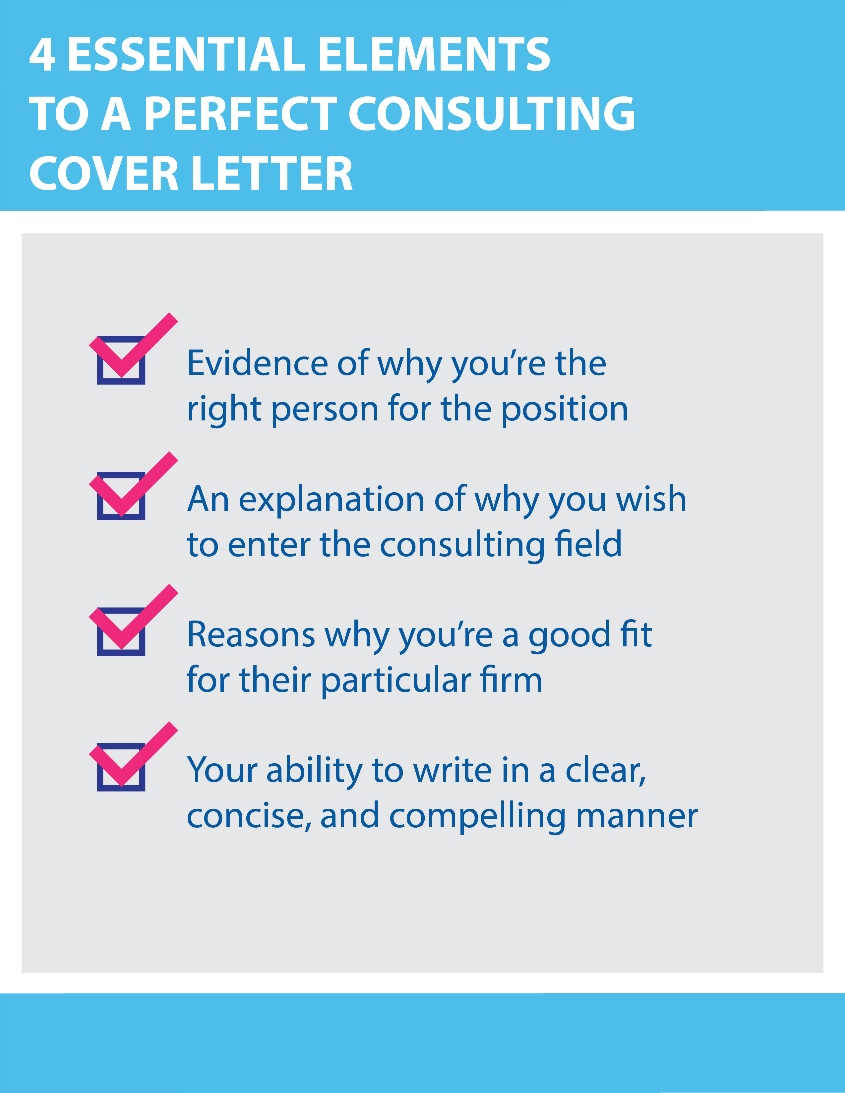FREE Resume Tips Email and Video Series
This form collects your name and email so that we can add you to our email list that delivers the free resources you are requesting. Check out our privacy policy for details on how we protect and manage your submitted data.
We’ll never spam you or share your email. Unsubscribe at any time.
Your cover letter can make a big difference when applying for a management consulting position. Because the cover letter is typically read before your resume, it plays an essential chronological role during the application process.
Consulting firms will typically read your cover letter to quickly identify what makes you different from thousands of other applicants. Therefore, writing a strong and unique cover letter can make you stand out from the competition and ensure that your achievements aren’t overlooked.
A strong cover letter presents an excellent opportunity for you to demonstrate why you’re the best candidate for the job, and to plead your case as to why the firm should hire you over other applicants.
This guide will cover 11 essential steps towards writing the perfect consulting cover letter.
Tip 1 — Know What Consulting Firms Are Looking For
The top consulting firms receive hundreds of thousands of applications each year. For example, McKinsey receives approximately 200,000 applications annually, of which only 2,000 applicants receive an offer. Consulting firms are faced with the arduous task of narrowing down the candidate pool to include only the best.
Interviewing candidates is not a cheap process. The firm wants to ensure that any candidate they interview is qualified for the position, is prepared for management consulting as a career, and is a good fit for the firm.
Therefore, top consulting firms look for four essential elements in a cover letter.
- Evidence of why you’re the right person for the position
- An explanation of why you wish to enter the consulting field
- Reasons why you’re a good fit for their particular firm
- Your ability to write in a clear, concise, and compelling manner

When reading cover letters, screeners will often ask,“Did the applicant spend enough time preparing a strong letter? Have they done their homework regarding the firm and the position in question? Do they have adequate writing skills to prepare compelling emails, reports, and presentations?“
A cover letter is a challenging document to prepare. You may feel worn out after spending hours on your resume, only to realize that you also need to spend as much time (if not more) on your cover letter.
Rather than looking at your consulting cover letter as an annoying extra step, think of it as an excellent opportunity to emphasize your skills and experiences and to set yourself apart from other applicants.
Tip 2 — Make Sure the Letter Has TheseFiveDistinct Sections
While your cover letter doesn’t need to take a formulaic approach, there are five distinct sections that should be covered. They are:
- An Introduction
The introduction should contain which position you’re applying for, your name, address, and contact information. It should also be short, sweet, and entertaining. Write it in such a way that the screener will want to keep reading into the second paragraph.
- Why You’re a Great Candidate
This is the section where you should blow your own horn. Each sentence should speak to your skills, education, and experiences — tying everything back to why you’re a great candidate. Ideally, this section should include your top three achievements to date (relevant to consulting, of course).
- Why Consulting is the Right Fit for You
Remember that the top priority of most consulting firms is to find out whether you’ll become a great consultant if hired. Even with memorable and unique qualifications, a recruiter may not be convinced that these skills will make you a good management consultant. To leave no doubt in their mind, dedicate a section towards explaining why you’re the right person for the job. You can use previous experiences (such as internships, jobs, or academic courses) to tie your career goals to the position in question.
- Why You’re Applying for the Position
The next section should cover why you chose to apply for this exact position in this firm. When laying out your case, identify unique reasons as to why you think McKinsey, Bain, BCG, Deloitte, or any other firm is your firm of choice. To make a compelling argument, identify specific people, reports, or projects that make your story believable. Don’t hesitate to mention specific employees or projects that caught your eye and sparked your interest.
- A Solid Conclusion
Finalize the letter by restating why you believe you’re a great candidate and how you can be of value to the company.
Tip 3 — LinkYour Cover Letter to Your Resume

A consulting cover letter is essentially an opportunity for you to expound on the information you wrote in your resume. What does this mean? It means that your cover letter should highlight the unique achievements, skills, and experiences (relevant to the position) that make you stand out from other applicants.
Your resume and cover letter should work hand in hand to strengthen your application further and demonstrate what makes you stand out.
Start off by identifying what you want the consulting firm to know about you. Draw attention to your career achievements. Maybe you started a business and sold it for a significant profit, or you worked overseas for a few years and have a diverse skillset.
Make sure that unique experiences are mentioned in the first few paragraphs of your cover letter to pique the interest of the resume screener.
Many resume screeners don’t actually read your entire resume.They simply scan it to identify specific items that make you stand out. Because resume screeners scan through hundreds of resumes at a time, they can easily overlook your unique achievements.
The cover letter is your opportunity to prevent this from happening. When you go into detail about achievements in your cover letter, you essentially draw the attention of screeners (and thus give yourself a better chance to land an interview).
Tip 4 — Don’t Forget About Your Resume
Even after referencing the unique skills you have in your cover letter, you need a strong consulting resume to back up your claims. A consulting resume is different from other standard template resumes, as it needs to emphasize a combination of skills that can make you successful as a consultant.
Here are resources that can help you prepare a strong consulting resume. A quality consulting resume will take just as much attention to detail as writing a strong cover letter will. In a nutshell, writing a consulting resume requires you to reflect on your past experiences, select the ones that are most relevant to consulting, and summarize them in a manner that resume screeners can easily scan and digest.
Top consulting firms typically look for the following in your resume:
- Big brand names (employers and schools)
- Strong academic performance (high GPA)
- Strong analytical skills (demonstrated in high standardized test scores)
- Strong leadership and communication skills
- Achievements versus career years (the longer your career is, the more achievements that screeners expect to see)

Also, refer to this resource to identify the top five mistakes that applicants make when writing a consulting resume.
Tip 5 — Avoid Using a Standard Template for Your Cover Letter
It’s no secret that it can be a pain to write a strong cover letter. It takes a lot of time and reflection. You’ll have to revise and edit the piece multiple times before submitting it. But, to truly stand out from other applicants, your letter needs to be interesting, personal, and unique.
The biggest mistake you can make is to copy a standard cover letter template and simply plug in your name and skillset. Screeners hate standard form letters because they’re boring to read, and they show that you’re unwilling to put in the necessary time and effort to write something unique. Because recruiters read thousands of cover letters, they can easily tell when a cover letter is written from a template.
When writing your consulting cover letter, make sure that every sentence is unique. While you may draw inspiration from various templates, add your personal twist to each word and modify it in a manner that emphasizes your unique skillset. For example, instead of starting with the usual format:
“Dear Sir/Madam, I write to apply for a consulting position….”
You can make things more interesting by starting off with what makes you different. Here’s an example:
“After attending Harvard for both my undergraduate and MBA education, I am confident in my ability to become successful as a [insert job position here] at McKinsey.”
Another example:
“My experiences overseas as a Peace Corps volunteer put me in a position to be successful as a [insert job position here] at BCG.”
The idea is to make every sentence in your cover letter count. Add a personal twist to all ofyour skills and experiences and tie them to the job responsibilities of the open position.
Tip 6 — Highlight Your Skills and Experiences via Evidence-Based Storytelling
In your cover letter, the goal should be to tell your story. Rather than simply listing your skills and abilities, demonstrate how various experiences have molded you into the perfect candidate for the position in question. Strive to show that you have what it takes, instead of telling.
For instance, instead of simply stating that you can lead, give a specific example of an experience where you showed leadership qualities. This evidence-based approach shows recruiters that your prior experiences have equipped you with the necessary skills to be successful.
Telling a story makes your cover letter much easier to read. It also makes you stand out from thousands of other applicants who may simply state “I’m a leader,” or, “I’m a hard worker.”
As you use this evidence-based approach, tailor every experience you mention to a specific skillset that is required for the job. If the position requires a candidate with strong interpersonal skills, explain a time when you worked within a team to achieve tangible results. Also, list out any challenges and how you overcame them.
It’s not simply about telling a story. Rather, it’s about telling a story that highlights why you’re a good fit for the job, as well as what makes you stand out from the competition.
Tip 7 — Show Your Value
A common mistake that many applicants make is to only think about personal achievements when applying for consulting positions. Recruiters often read through cover letters that have lots of “me meme” in them.
This is to say that many applicants focus on how they can benefit personally from the position in question, instead of demonstrating how they can become valuable employees (and eventually partners).
Many cover letters talk only about how the candidate will be able to elevate his/her career, experiences, and skills. Such letters only focus on personal goals instead of demonstrating how you can help the company become better. Remember that screeners are looking for candidates who will be of benefit to the firm, not those who are simply using this as an opportunity to enrich themselves and their careers.
When writing your cover letter, emphasize how your skillset will be of benefit to the company. To do this successfully, you need to do your research with regards to what the short-term and long-term goals of the firm are. You can then use these goals and relate them to your unique abilities and experiences.
Tip 8 — One Page Is the Perfect Length
It can be tempting to write a long cover letter, especially if you have a diverse skillset that you feel should be highlighted. However, being concise and keeping it relevant to the position is a much better strategy.
Aim to select only the most relevant experiences that apply directly to the position you’re seeking. You can typically fit these experiences in only one page.
Being concise also makes it easier for recruiters to read through your cover letter quickly without overlooking anything. Edit it down to a concise letter by re-reading and adjusting your original cover letter. The more you read it, the more unnecessary words and content you will find to take out.
Start early so that you can give yourself plenty of time to adjust your cover letter accordingly.
Tip 9 — Be Specific About the Position You’re Applying To
While this may sound obvious, many applicants tend to go off on a tangent about their skills and abilities without first mentioning the job they’re applying for. You should always state the position and office of the job you intend to apply for within the first sentence.
Remember that this information can still be included as you emphasize what makes you different. Here’s an example of an opening sentence that was used earlier in this guide:
“My experiences overseas as a Peace Corps volunteer put me in a position to be successful as a [insert job position here] at BCG.”
Being specific and concise about the job you’re applying for will make it easier for screeners to quickly recognize which position you are interested in.
Tip 10 — Give Yourself Time to Write a Quality Letter
Similar to consulting resumes, writing a strong consulting cover letter takes time. To be successful, you need to consider everything you’ve accomplished as well as what makes you different from everyone else. Don’t think that you can write a strong cover letter in one night. It requires multiple iterations, careful re-reading, and timely feedback.
You also need to make sure that the cover letter blends seamlessly with your resume, and it expounds on the outstanding skills and experiences contained in the resume itself.
Tip 11 — Proofread Thoroughly

And finally, make sure you eliminate any grammatical or spelling mistakes from the final cover letter. These mistakes make you appear careless and can result in being disqualified in the screening process. Don’t let something so simple be your downfall.
Take time to proofread. Ask peers and fellow professionals review your cover letter and give you feedback as well.
Example
Here is an example cover letter that highlights the tips I’ve mentioned. Reference this example as you write your cover letter to make sure that you hit all of the important sections. These items do not necessarily need to appear in the order I have them listed. But, make sure that they are all represented in your cover letter. Below is an example consulting cover letter.
You can also download the example by clicking here.

More Resources:
Free Case Interview Prep Program – Sign Up For Free Instant Access to the Largest Collection of FREE Case Interview Training Resources.
We’ll never spam you or share your email. Unsubscribe at any time.




219 thoughts on “Consulting Cover Letter Tips (and Template)”
Thank you for the detailed guide! I was wondering to what extent the “why me?” and “why consulting?” paragraphs should be changed for each company?
I want to make my cover letter seems as personable as possible, and this will undoubtedly happen in the final “Why x role at x company?”, but it seems to me that the first two paragraphs will remain fairly similar for each company?
Please correct me if I am wrong, and I would love to hear your thoughts.
Many thanks
Christian Orr
Christian,
Implied in your question is the consulting firms are all the same and relatively interchangeable. This converse of this is all candidates are basically the same and relatively interchangeable. Consulting firms want to hire people who REALLY, REALLY want to work for THEIR firm (as opposed to any firm).
So the answer of the why and why consulting could be tailored to that specific firm’s flavor of consulting, the firms relative strengths and weakness, and how your strength would fit into their firm.
If you address this more in the why X role in Y firm that’s fine. If the firm is different enough, would make sense to tailor as much of the letter as possible.
I used to spend 2 hours per cover letter per firm separate from hours of research and networking per firm. When the resume reader reads 600 cover letters to pick out 30 to interview, you need every sentence in that letter specifically designed to distinguish yourself from other candidates.
Distinguishing your achievements and skills is one way to do this (and you should do it). Demonstrating your knowledge and interest in the firm is another. Very few people do this latter step. (This latter skills is a signal that when you work for a new client you would take the exact same level of care and interest in understanding your new client).
-Victor
Hello Victor,
I graduated from Politecnico di Milano, Italy with a 74.5% average. Since it is not an amazing score, I am confused if I should include it in my resume and Cover letter or not. My reasoning for low marks would be the fact that I come from an application-oriented background while PoliMi has a very strong theoretical approach to the curriculum.
Do you think this reason would justify? Or should I just ignore my average?
Best,
Jagadish
Jagadish,
In your case, I would leave out the score. Don’t be surprised if they contact you to ask for the score. If you’re applying to a top 3 firm, the score will be a problem and you likely won’t make the resume screen. If you’re applying to a smaller firm, you’ll have a better chance of getting an interview.
-Victor
Victor-
I have a few clarifying questions regarding cover letters/resumes for experienced hire MBB applicants from non-target universities. I hope the general situation will be helpful for other readers.
Background:
1.) I have an undergraduate engineering degree (3.4 GPA), a minor in business (3.8 GPA), and an M.S. degree in Petroleum Engineering (4.0 GPA – top 1% – funded by Shell) all from non-target school Texas A&M; however, the petroleum program is the top in the nation (along with Stanford) and is well respected worldwide within the upstream oil and gas industry.
2.) I have just under 4 years of experience with a worldwide upstream technical consulting firm working on and managing engagements with quite a few domestic and international BBNs which I am able to include in my cover letter/resume (thank you for clarifying my confidentiality question in the archived emails).
3.) I am applying for positions specifically seeking Oil & Gas – Associates outside of the United States for MBB.
Questions:
1.) How much credence, if any, do algorithms and administrative recruiters put into individual program prestige at non-target schools?
2.) Is it worth emphasizing early in a cover letter the credentials of the academic program over domestic and international BBNs with whom I have been entrusted to independently travel to and engage with in my current consulting position?
I am less concerned with academic program credentials in the hands of an oil & gas domain expertise recruiter but want to have the best chance of it getting there.
Thank you in advance.
Best,
Patrick
Hi Patrick,
In general lead with the BBN’s first. Assume recruiters are generalists that know recruiting, but don’t know oil & gas. One day a recruiter is recruiting for oil & gas, next day financial services, next day retail — or depending on the firm, they recruit purely for a general associate pool. For example at McKinsey, vast majority of Associate hires are for general consulting roles. The decision to specialize in Oil & Gas would be made after 1 – 3 years at the firm.
Program specific prestige is less impressive to generalists. Assume your application gets to a generalist before it ever gets to a specialist (Assuming it ever gets to specialist at all).
-Victor
Victor,
Thank you very much for your website. I am a senior student in Beijing. I want to apply for the Business Analyst Intern. My question is this. I don’t have much intern experience , but I took part in many academic competitions, like national model negotiation competition during the last three years. Should I stress this in my cover letter ?
Dear Victor,
I would like some advise on my chances and best method of working for one of the big management consulting firms.
I am switching career paths after achieving an MD degree and completing some post graduate clinical training (medical residency). I am not coming straight out of medical school and I mostly have clinical work experience. I do have a BBA undergraduate Honors degree from UT Mccombs school of Business. Please advise.
Neel
Victor,
Thank you very much for your website–it has a tremendous amount of info on it. My question is this. I was in a phd program that I completed a year of and then I dropped out due to a family emergency. Should I include that in my resume?
Thanks,
O.B. Roi
O.B.
Most likely yes, otherwise it would be hard to account for the time. If the program is a well known one, then definitely yes. You will need to explain why you dropped out in your cover letter.
-Victor
Hi Victor,
I am about to apply for McK. I have two MSc degrees, one in management Engineering, one in Finance and Management, a one-year consulting experience in KPMG Advisory and now working for a consulting boutique in supply chain London. My girlfriend works for McKinsey Italy, however I would like to apply to the London office and I know it is much more difficult. I went to the “retreat” this year with the mcKinsey guys, and learnt a lot about their culture etc etc. However, how would you advice me to behave (in a cover letter / interview) about my girlfriend working there? And what about the Retreat? Should I mention I’ve been there? Thanks a lot
Mark.
I’d suggest saying something like “as a McKinsey significant other and retreat attendee, I’ve had the opportunity to get to know several people in the firm’s Italy office. What I like about the firm’s culture and people is ___________, and that’s what I’m applying, etc….”
Mention it, but don’t over emphasize it. It will help them realize that you have had a chance to get to know the firm. So when you say you are interested, it is because you have done some homework and your interest should be considered well researched.
If at all possible, you should try to build a contact in the UK office and mention that person’s name in the cover letter. Ideally you would want that person to forward your cover letter and resume to the UK recruiting contact rather than sending it directly.
Victor
Victor,
Thank you for all of the resources you provide to those of us interested in the Consulting field. My ‘story’ is different, so I would love some feedback from someone who knows the ins and outs of the Consulting field.
I have a MS in Speech-Language Pathology. I have been working as a Speech Pathologist in hospital settings since graduation, first for a SNF (skilled nursing facility) and for the past 3 years for the one of the top-5 largest Children’s hospitals in the nation. I work in critical care areas (ICU settings, etc.) with sick kids and deal with a lot of difficult cases.
Because of financial commitments (already have a masters), I am currently enrolled in a part-time MBA program (just started this fall). I have grown more and more interested in consulting as a career change, particularly healthcare consulting.
I had a 4.0 in my masters program, my job is highly respected in my field, and I have a large number of qualifications that would make me succeed as a healthcare consultant (job requires a lot of flexibility, complex problem solving, and difficult conversations with a wide variety of people- from doctors to parents).
Is there any chance that I would be even considered for a job as a healthcare consultant? Not necessarily with Bain, McKinsey, etc…somewhere ‘middle of the road’ in the top 50 firms. Would you suggest that I apply now with just a Masters or wait until I have both a masters and MBA (when the MBA is not from a top-tier school)? Or am I way out of my league here?
What are your thoughts? Thanks in advance!
Katie,
Your situation is a tough one to assess. For the top 10 firms, I don’t think you would be competitive. They usually take MD’s or MD MBAs. For the middle of the pack firms, that’s tougher to say. I don’t know those firms that well, and when you further focus on health care exclusively, I have even less knowledge.
I would say it is worth testing the waters now by networking and meeting people in the kinds of firms you intend to target. I don’t think your competitiveness will change by much by being enrolled in your MBA program versus having graduated. If you are competitive, you should be able to connect with people. If you are not or will not be competitive when you graduate, you would get shut out now. I would recommend testing the waters to see where you stand.
One thing you will need to work on is your story as to why your prior background would give you an advantage as a consultant. For the MDs turned consultant, the standard story was the clients (all MDs) would take them more seriously than an MBA with no medical background.
So you’ll need a good story as well. Also the response you get may vary significantly by firm depending on their area of focus within healthcare. For example, if a firm mostly did pediatric healthcare the fact that you have clinical experience of any kind with kids could be seen as a major plus. Or maybe a general health care firm has a children’s hospital as a major client – they might value your background more than another firm that mostly works with pharma.
Just something to keep in mind.
Good luck,
Victor
Victor,
First of all, you have amazing resources helped me a see big picture’
l ‘m from Istanbul, Turkey, and l have graduated last year, l am working at PwC as Analyst but my position is not consulting division,mostly includes process analysis and application developmental stuffs also l had internship exprience at Deloitte Enterprise Risk. l have not graduated from a top undergrad schools in Turkey, but l have started my Financial Engineering master degree at best school in Turkey, my undergrad degree is Mathematical Engineering, So, basically l want to switch my career with consulting , really want to do , l have no GRE, GMAT so l havenot good test score, l have Toefl which is 85 is not high grade, but l really want to make true consulting, l feel it is the best job suits me, what should l do, which strategy l should follow, l thought prepare for Toefl again but l takes time, and applicatipon season has already come, so l need suggestions from you including cv- cover letter writing to most importantly could you see me as strong candidate?
All the best,